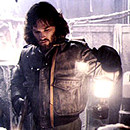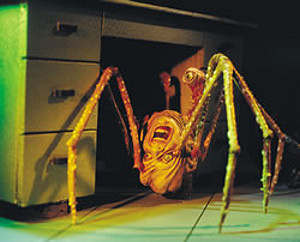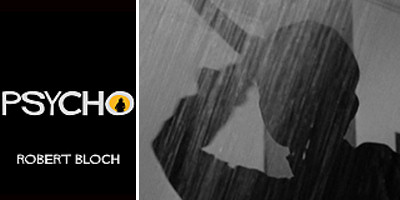8 Kick-Ass Movies You Didn't Know Were Based on Books

Nobody reads books these days. After all, what's the point? There's no way some novel could ever kick as much ass as, say, watching Sylvester Stallone punch a guy's head off his shoulders. Or, could it?
Believe it or not, a lot of the most kick-ass movies were adapted from kick-ass books. No, we're not just talking Lord of the Rings here. We're talking about ...
The Rambo Movies

The Film:
First Blood is a somber reflection of the hardships that faced Vietnam War veterans upon their return to their native country, in which the protagonist blows up a helicopter with a freaking rock.

The Book:
No really. There were Rambo books. Seriously. No, they weren't composed entirely of onomatopoeias meant to represent the sound of explosions.
First Blood was written by author David Morrell, who wrote a lot of books that had pictures of knives on the cover.

In the book, Rambo is not the good guy, as he basically flips out and kills a whole town because the Vietnam War drove him insane. Also, the book's ending is depressing, as Rambo stops his totally awesome rampage to be shot in the face.
That's right; Rambo dies at the end. Hollywood decided to change that, too, paving the way for three sequels. Even stranger, Morrell wrote a sequel to the book to coincide with the film, which somehow portrays Rambo as still alive, without so much as an opening chapter where a necromancer summons him from Valhalla.
For the book version of Rambo: First Blood Part II The writer had to share a co-author credit with James Cameron and Sly Stallone (who helped dream up the story for the sequel) which is kind of sad, or not, depending on how much he got paid.
The Thing

The Film:
Yes, The Thing. The one where the guy's torso grows teeth and bites another guy's arms off.

The Book:
It was actually a novella (that's where the writer didn't feel like writing a whole novel and just wrote part of one) called Who Goes There? and it was written way back in 1938 by John W. Campbell (the whole thing is online here). Yes, it even has that scene where they're poking at the blood and it comes to life and goes flying out of the dish and we poop our pants.
It's considered one of the best science fiction novellas ever written, and you can thank the writer for all those elements of paranoia and tension that made the film great. On the other hand, the movie has that scene where a guy's head turns into a crawling spider monster and you probably need to see that one to get the full effect. Also, Kurt Russell.

Gah! Did that seriously just happen?
We'll admit it, those sorta fake-looking puppets freaked us out. If you ask us, Al Gore's An Inconvenient Truth would be much more effective if he just screened this movie and followed it up by saying, "See that? It lives in the Arctic. If you keep driving your SUV, that thing is going to thaw. And, it's going to be pissed." Of course, the Nobel Prize Committee probably wouldn't go for that.
Who Framed Roger Rabbit

The Film:
Who Framed Roger Rabbit is the zany story of a cartoon bunny's madcap antics as he battles a corrupt legal system that has framed him for a brutal homicide.
The Book:
Well, we asked the librarian for Roger Rabbit, and apparently, she gave us a William S. Burroughs novel instead. This thing is just plain bizarre. Seriously, when we buy a book about a cartoon rabbit, we expect a little bit more lightheartedness and a lot less "Oh, dear God, NOOOOOOO!"

The book is called Who Censored Roger Rabbit? by Gary Wolf (whether that's his real name or cartoon name, we can't be sure). Oh, did we forget to mention that Roger Rabbit gets machine gunned to death?
No, seriously. That actually happens. Apparently, he never learned the old "rabbit season, duck season" trick. When's the last time that you saw that happen in a Disney movie? Aside from Bambi's mother. Or, the mom from Finding Nemo. Or, Mufasa from the Lion King. OK we guess Disney's sort of messed up too.
Psycho

The Film:
This chilling and suspenseful tale recounts the crimes of a cross-dressing recluse who enjoys tormenting innocent people, which may or may not have been based on the life of J. Edgar Hoover.
The Book:
Remember how Hitchcock was called a genius, because of the amazing twist in the story, namely that (WARNING: 47- year-old spoiler ahead) the main character gets killed not long into the film? Yeah, he didn't come up with that. It was in the novel of the same name by Robert Bloch. So, why do people remember the film and not the book? Well, mostly because of this:
In 1960, that scene scared a nation off of taking showers, which inadvertently created the hippie. We don't care how many times you write the words "stabbity, stab, stab, stab" on the page, it just doesn't have the same effect as it unfolding in front of you. No, not even if you pay an orchestra to follow you around and make the shrieking violin noises.
Bloch wrote a sequel, called Psycho II (you don't often see novelists just stick a "II" at the end of their sequels, do you?) which the studio hated and refused to adapt to film, despite its awesome cover.

Instead they followed up the classic with a series of cheesy sequels in the '80s that were totally unrelated to his book. The studio reportedly didn't invite him to any of the screenings, in a great example of Hollywood "What-have you-done-for-me-lately" douche-baggery.
Dr. Strangelove

The Film:
Dr. Strangelove is Stanley Kubrick's darkly comedic masterpiece that uses his witty and cutting brand of satire to boldly assert that the destruction of Earth is, in fact, bad.
The Book:
Dr. Strangelove is actually based loosely on the 1958 novel Red Alert by Peter George, which differs from the film slightly in that it is not a comedy at all.
That's right, the inspiration for one of the funniest movies of all time has about as many laughs as the average Wayans brothers movie. Can you imagine a dry, mirthless and completely joke-free Strangelove? That would be like ... well, actually, it would be like about half of Dr. Strangelove. But the other half is, like, really funny.

The book doesn't end with the destruction of the world, as the rogue bomber gets shot down before it can drop its nuke on the Russians. You have to admit the film's ending is superior, because otherwise the message becomes, "Nuclear brinksmanship is a dangerous game, but it will probably turn out Ok in the end."
Planet of the Apes

The Film:
This classic parable provides the audience with a moral that resonates with all of humanity: If you put monkeys in charge of society, don't be surprised when everything explodes. Meanwhile, Charlton Heston overacts, punches aliens and nails attractive women in a way that would make Capt. Kirk proud.
The Book:
The book was written by Frenchman Pierre Boulle, who also wrote The Bridge Over the River Kwai which itself became a classic war movie. His title (originally in French) actually translated to Monkey Planet, which we can all agree the studio should have kept.
If you look around, you actually find that they sell the book and DVD as a single set ... which, by the way, is sold with a cover that spoils the ending:
 Above: Spoilers
Above: Spoilers
The author's actual life was probably more interesting than either of those books. Boulle joined the army in French Indonesia during World War II, then became a special agent to help resistance movements fuck up the Nazis wherever they went. He got captured by Nazi loyalists and somehow this inspired him to write. Maybe the prison camp was run by armed monkeys, we're not sure.
Either way, he deserves credit for creating antagonists that were taken seriously, even though they're animals wearing people clothes. Science has conclusively proven that to be adorable.
Death Wish

The Film:
Charles Bronson fights a one-man war on crime by standing in dark alleys, waiting to be mugged, then shooting the muggers. One seriously must wonder why Batman never considered this approach. That would have saved him some time.
The Book:
No, the movie this was based on wasn't a Punisher comic book. There's actually a freaking Death Wish novel. The book is the same premise, with hilariously contrived justification for vigilantism and graphic depictions of the protagonist-killing scumbags. Though, to be fair, the novel only inspired the first Death Wish which sort of addressed the issues of victimhood and vengeance, and not the numerous sequels in which Charles Bronson strapped on a machine gun and killed every jaywalker within a 10-mile radius.

The author (Brian Garfield) was actually a Pulitzer nominee (not for Death Wish, though that would have been awesome). The book he wrote before Death Wish was called What of Terry Conniston?, which we're assuming taught him the importance of not giving your book a retarded title. He proved it by following up with Death Sentence, Tripwire, Fleshburn and Death Blood, only one of which we made up.
Death Sentence, by the way, was just made into movie; it's also about a mild-mannered man who goes on a rampage to avenge a terrible crime. How was it? Well, let's put it this way: They traded Charles Bronson for Kevin Bacon.
Die Hard

The Film:
It's Die Hard. Do we need to recap this for you? Yeah, we didn't think so.
The Book:
That's right, Die Hard, one of the least bookable films of all time, is loosely based on the novel Nothing Lasts Forever, by the obviously fake-named Roderick Thorp. That book is a sequel, so you'd assume the first one was called Nothing Lasts Forev, but it was actually given the imaginative title of The Detective. It was itself adapted as a film in 1968. In that movie, the John McClane role was portrayed by ... wait for it ...

Frank Sinatra.
Go ahead. Look at Die Hard the same way again. We dare you.
Anyway, while no book in history can possibly top Die Hard (which we believe Roger Ebert described as "the cinematic equivalent of Hulk Hogan wrestling a bear. While on fire."), it does have the same premise (though all the character names were changed for some reason). A later book the guy wrote, Rainbow Drive, got turned into a 1990 movie starring Peter Weller ... the guy who played RoboCop. That movie isn't as well known, because the title made it sound like a film about a gay resort.

In some alternate universe, we like to think this connection led Mr. Thorp, Bruce Willis and Peter Weller to sit down for drinks one day. The three would walk away from this meeting in our alternate 1991 with an agreement to make Die Hard vs. RoboCop. In this alternate universe, the 1993 Academy Awards had to be canceled, because one film won every single award.
If you like this article, check out Rick's The 10 Best Animated Movies for (Traumatizing) Kids.
Or you could...
Spread some holiday cheer with this e-card from Cracked.com and IFC's Whitest Kids You Know.